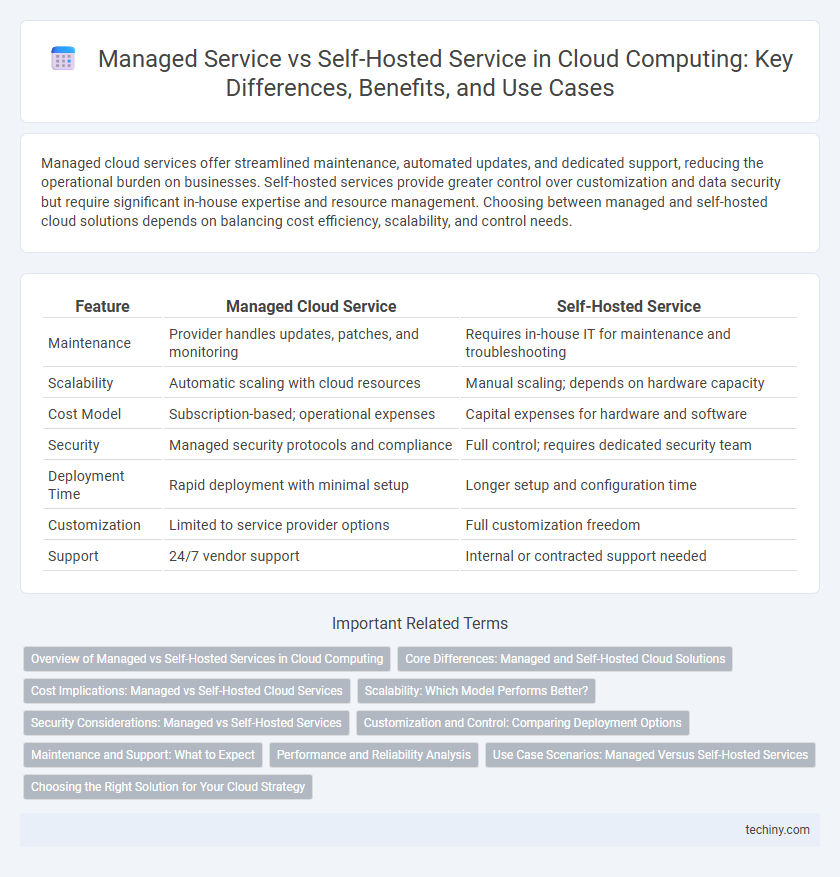Managed cloud services offer streamlined maintenance, automated updates, and dedicated support, reducing the operational burden on businesses. Self-hosted services provide greater control over customization and data security but require significant in-house expertise and resource management. Choosing between managed and self-hosted cloud solutions depends on balancing cost efficiency, scalability, and control needs.
Table of Comparison
| Feature | Managed Cloud Service | Self-Hosted Service |
|---|---|---|
| Maintenance | Provider handles updates, patches, and monitoring | Requires in-house IT for maintenance and troubleshooting |
| Scalability | Automatic scaling with cloud resources | Manual scaling; depends on hardware capacity |
| Cost Model | Subscription-based; operational expenses | Capital expenses for hardware and software |
| Security | Managed security protocols and compliance | Full control; requires dedicated security team |
| Deployment Time | Rapid deployment with minimal setup | Longer setup and configuration time |
| Customization | Limited to service provider options | Full customization freedom |
| Support | 24/7 vendor support | Internal or contracted support needed |
Overview of Managed vs Self-Hosted Services in Cloud Computing
Managed services in cloud computing provide automated infrastructure management, security, and maintenance by third-party providers, reducing operational complexities for businesses. Self-hosted services require organizations to deploy and manage their own hardware and software, offering greater control but demanding significant technical expertise and resources. Choosing between managed and self-hosted depends on factors such as scalability needs, cost considerations, compliance requirements, and in-house IT capabilities.
Core Differences: Managed and Self-Hosted Cloud Solutions
Managed cloud services provide automated infrastructure management, security updates, and scalability, reducing the need for in-house IT expertise. Self-hosted cloud solutions require organizations to invest in hardware, software maintenance, and manual configuration, offering greater control but increased responsibility and operational overhead. Key differences include management complexity, upfront costs, and the flexibility to customize or scale resources independently.
Cost Implications: Managed vs Self-Hosted Cloud Services
Managed cloud services typically involve predictable subscription fees that cover maintenance, updates, and support, reducing the need for in-house IT staff and infrastructure expenses. Self-hosted cloud solutions require significant upfront capital for hardware, software licenses, and ongoing operational costs such as power, cooling, and dedicated personnel. Evaluating total cost of ownership (TCO) reveals managed services often lower long-term expenses through scalable pricing models and minimized administrative overhead.
Scalability: Which Model Performs Better?
Managed services in cloud computing offer superior scalability by automatically adjusting resources in response to workload demands, ensuring optimal performance without manual intervention. Self-hosted services require significant planning and infrastructure investment to scale, often leading to delays and inefficiencies during peak usage periods. The dynamic resource allocation of managed services outperforms self-hosted models in handling fluctuating and unpredictable workloads.
Security Considerations: Managed vs Self-Hosted Services
Managed services offer enhanced security through dedicated teams that continuously monitor, update, and patch systems, reducing vulnerabilities and mitigating cyber threats more effectively than many in-house teams. Self-hosted services require organizations to implement and maintain robust security protocols independently, which can increase risks due to potential human error, delayed updates, or resource limitations. Compliance with industry standards such as GDPR, HIPAA, or PCI-DSS is often streamlined by managed service providers through automated audits and standardized controls, whereas self-hosted environments demand rigorous internal management to achieve similar compliance levels.
Customization and Control: Comparing Deployment Options
Managed services offer limited customization due to standardized infrastructure and configurations, prioritizing ease of use and maintenance. Self-hosted services provide extensive control over hardware, software, and security settings, enabling tailored deployment to meet specific organizational requirements. Businesses seeking robust customization and direct management benefit from self-hosted environments, while those valuing simplified operations may prefer managed cloud services.
Maintenance and Support: What to Expect
Managed cloud services provide continuous maintenance and expert support, ensuring system updates, security patches, and troubleshooting are handled by specialized teams to minimize downtime. Self-hosted services require organizations to allocate internal resources for maintenance and technical support, which can increase operational complexity and risk of delays in problem resolution. Expect managed services to offer proactive monitoring and rapid incident response, whereas self-hosting demands greater in-house expertise and can lead to longer periods of vulnerability or performance degradation.
Performance and Reliability Analysis
Managed cloud services offer enhanced performance through optimized resource allocation and professional maintenance, ensuring minimal downtime and rapid scalability. Self-hosted solutions demand significant expertise to maintain reliability, often facing challenges in consistent uptime and hardware failures. Performance discrepancies arise as managed services leverage advanced monitoring tools and redundant architectures unavailable in typical self-hosted environments.
Use Case Scenarios: Managed Versus Self-Hosted Services
Managed cloud services excel in use cases requiring rapid deployment, scalability, and minimal in-house IT expertise, ideal for startups and businesses aiming to reduce operational overhead. Self-hosted services suit organizations needing extensive customization, strict compliance controls, and data sovereignty, often favored by enterprises with robust IT teams. Choosing between managed and self-hosted solutions depends on factors like budget constraints, regulatory requirements, and long-term maintenance capabilities.
Choosing the Right Solution for Your Cloud Strategy
Choosing the right cloud strategy involves evaluating the benefits of managed services versus self-hosted solutions based on scalability, control, and resource allocation. Managed services offer streamlined maintenance, automated updates, and robust security protocols, reducing operational overhead for IT teams. Self-hosted services provide greater customization and control, making them suitable for organizations with specific compliance requirements and in-house expertise.
managed service vs self-hosted service Infographic

 techiny.com
techiny.com